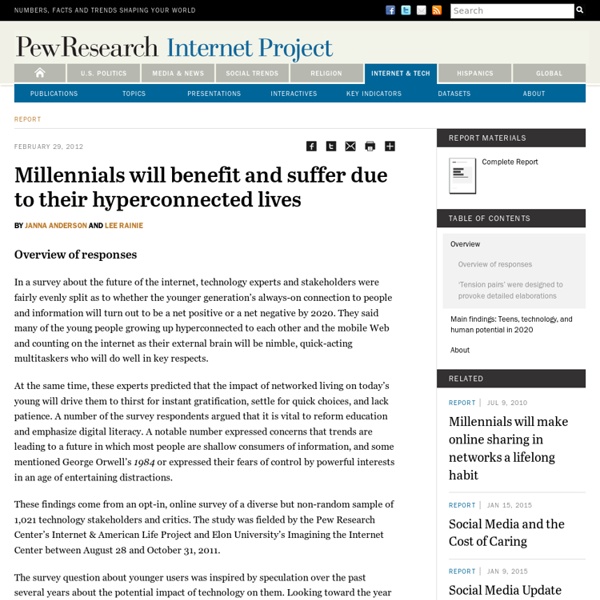Classroom Laptop Users Distract Others As Well As Themselves
Thursday, April 25, 2013 It won’t surprise anyone to learn that having a laptop computer open in a lecture class is an invitation to distraction for the user. But what about the students sitting nearby? A new study by a group of researchers at McMaster and York universities, both in Canada, finds evidence that laptop use in college classrooms distracts not just laptop owners, but their classmates as well. The researchers begin their article, published last month in the journal Computers & Education, by reviewing what we know about learning while our attention is divided:
Social media can give people a fear of missing out
It has been called FOMO, or the fear of missing out. Back in the day, people could just watch TV and get all of the information they needed for any given moment, but today, social media gives people many mediums to get information and find out what's going on at any time. This creates a problem for some people, as this wealth of knowing of what others are doing all the time, can be overwhelming and can make them feel like they're missing out on something.
Innovation and the Future Workforce: key trends for the decade ahead
We are currently living in an era of unprecedented change. It’s not just that technology has speeded up business cycles, or connected us into a pulsing 24-7 never-stop global community. It’s not even that stakeholders require instant responses in the midst of turbulent markets and increasingly complex supply chains and business partnerships.
Age of Distraction: Why It’s Crucial for Students to Learn to Focus
Digital classroom tools like computers, tablets and smartphones offer exciting opportunities to deepen learning through creativity, collaboration and connection, but those very devices can also be distracting to students. Similarly, parents complain that when students are required to complete homework assignments online, it’s a challenge for students to remain on task. The ubiquity of digital technology in all realms of life isn’t going away, but if students don’t learn how to concentrate and shut out distractions, research shows they’ll have a much harder time succeeding in almost every area. “The real message is because attention is under siege more than it has ever been in human history, we have more distractions than ever before, we have to be more focused on cultivating the skills of attention,” said Daniel Goleman, a psychologist and author of Focus: The Hidden Driver of Excellence and other books about social and emotional learning on KQED’s Forum program.
How Does Multitasking Change the Way Kids Learn?
Using tech tools that students are familiar with and already enjoy using is attractive to educators, but getting students focused on the project at hand might be more difficult because of it. Living rooms, dens, kitchens, even bedrooms: Investigators followed students into the spaces where homework gets done. Pens poised over their “study observation forms,” the observers watched intently as the students—in middle school, high school, and college, 263 in all—opened their books and turned on their computers. For a quarter of an hour, the investigators from the lab of Larry Rosen, a psychology professor at California State University-Dominguez Hills, marked down once a minute what the students were doing as they studied. A checklist on the form included: reading a book, writing on paper, typing on the computer—and also using email, looking at Facebook, engaging in instant messaging, texting, talking on the phone, watching television, listening to music, surfing the web. Related
Facebook: Is this any place for the not-so-self-assured to make friends?
Facebook, the social networking giant that connects 845 million people to one another, may be a jolly gabfest for the self-assured. But for those who suffer from low self-esteem, it appears to be a rather nasty trap, luring such people into self-disclosures that prompt many a Facebook friend to agree with their low opinion of themselves. A new study, set to be published in the journal Psychological Science, explored the dynamics of friendship on Facebook to see what benefits or pitfalls the site might offer to a population that could use the propping up of a few new friends: those who think poorly of themselves, fear judgment by others and are prone to social isolation and depression. Enlisting a slew of undergraduates for three separate studies, they found that those with low self-esteem are encouraged and emboldened by Facebook's capacity to provide a forum for social interaction that doesn't risk awkward face-to-face communication.
5 Reasons Why Traditional Employment Is in Trouble
According to the U.S. Labor Department, 2.1 million people resigned their jobs in February, the most in any month since the start of the Great Recession. This is startling given that the economy is not strong and that millions are out of work. The natural inclination would seem to me to be to hunker down and hang on to the job you have, no matter how bad it is.
Educational Technology and Mobile Learning: Terrific Mini Guide to Help Students Think Critically
December 26, 2014 Questioning is the key to critical thinking and through questions students get to explore the deep layers of meanings that would otherwise go unnoticed. Of course not all questions have this analytical ability. For instance, closed questions tend to limit the thinking choices available for students. The same with questions that promote factual recalling. Questions that emphasize the mechanical on the analytical are out of the list.
With Tech Tools, How Should Teachers Tackle Multitasking In Class?
Important research compiled on the effects of students multitasking while learning shows that they are losing depth of learning, getting mentally fatigued, and are weakening their ability to transfer what they have learned to other subjects and situations. Educators as well as students have noticed how schoolwork suffers when attention is split between homework and a buzzing smartphone. Many students, like Alex Sifuentes, who admit to multitasking while studying, know the consequences well.



